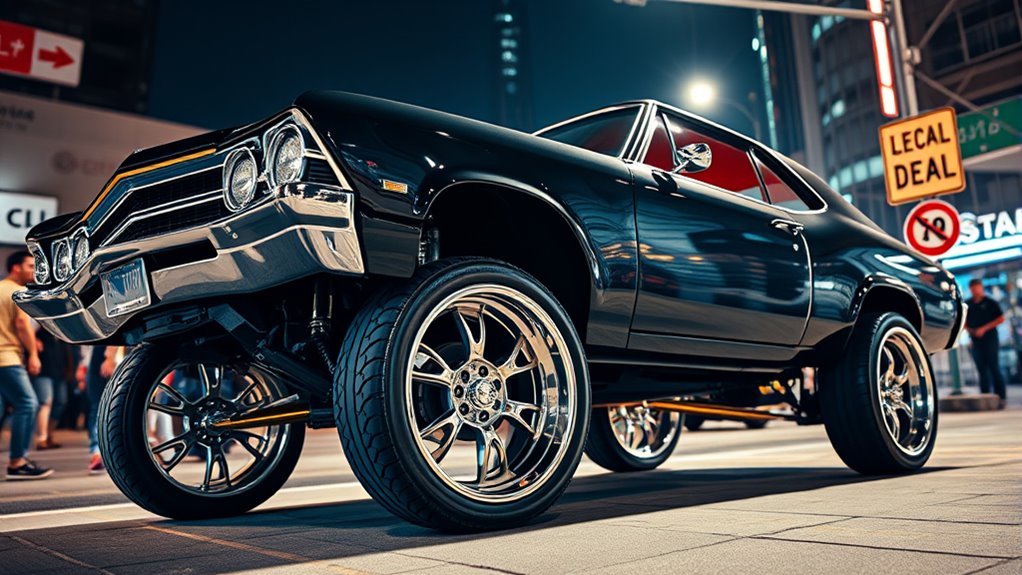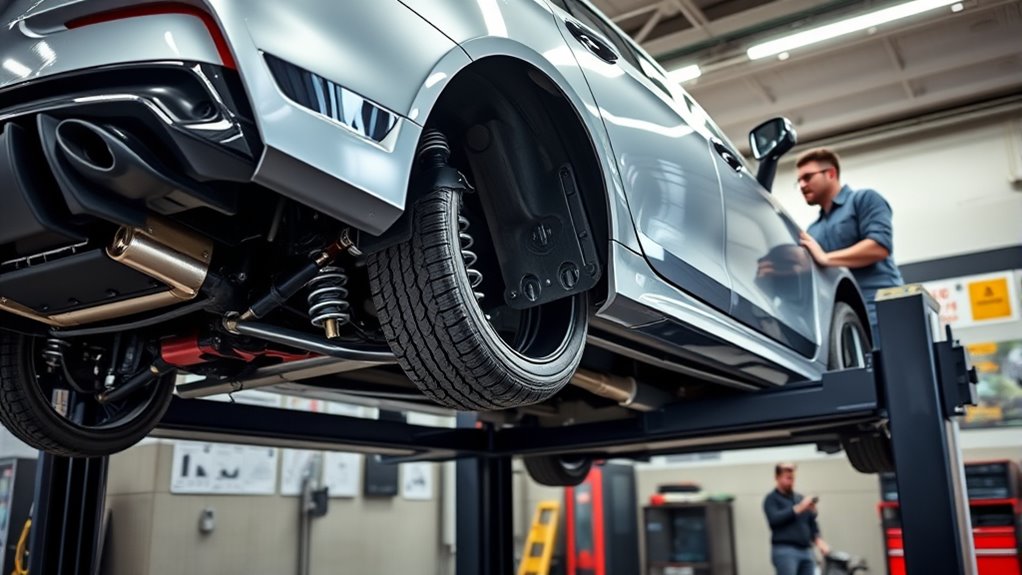When modifying your suspension, you must ensure improvements meet local safety laws and vehicle standards. Check your state’s regulations for lift heights and certification requirements, as violations can lead to fines or vehicle impoundment. Use certified parts and professional installers to stay compliant, and keep detailed records. Non-compliance can impact your warranty and insurance coverage, so understanding legal rules is vital. To learn more about staying legally compliant, keep exploring this topic further.
Key Takeaways
- Ensure suspension modifications comply with local, state, and federal safety standards and vehicle regulations.
- Obtain necessary certifications and keep documentation to verify legal compliance during inspections.
- Be aware of restrictions on lift heights and modifications based on vehicle weight and factory measurements.
- Disclose all modifications to insurance providers to avoid claim denial or policy cancellation.
- Use certified parts and professional installers to maintain vehicle safety and meet legal requirements.
Navigating State Regulations and Compliance

Managing state regulations and compliance is crucial when modifying your vehicle’s suspension. You need to be aware that laws differ from state to state, with some places being more restrictive. Many states set limits on how much you can lift your vehicle, often based on the factory height. Vehicle weight also plays a role; lighter vehicles typically face stricter rules. Certain states, like South Carolina, prohibit modifications that create a big height difference between front and rear fenders. Beyond state laws, local ordinances might impose additional restrictions. To stay compliant, check with your state DMV or local authorities for specific regulations. Consulting with regulatory agencies can help clarify complex rules and prevent potential violations. Failing to follow these rules can lead to fines, inspection failures, or even legal trouble, so thorough research is essential before making suspension modifications. Understanding regulatory compliance is essential to ensure your modifications meet all legal requirements. Being aware of practical support resources can help you navigate these complex regulations more effectively, especially when considering state-specific laws. Additionally, staying informed about creative practice can foster a proactive approach to compliance and problem-solving in this process.
Understanding Warranty Implications

When you modify your vehicle’s suspension, understanding how these changes affect your warranty is essential. The Magnusson-Moss Warranty Act protects you by preventing manufacturers from voiding your warranty solely because of modifications unless they can prove a direct cause. Dealers must show that the modification caused the failure; unrelated issues remain covered. However, certain modifications, like lift kits, oversized tires, or emissions changes, are often listed as potential void triggers. To protect your warranty:
Modifying your suspension won’t void your warranty unless it causes the issue.
- Keep detailed records of professional installations
- Use OEM-compatible parts
- Avoid cutting or welding during upgrades
- Verify coverage with your dealership beforehand
Additionally, understanding the importance of warranty rights can help you ask the right questions and ensure you’re fully aware of your rights and options. Being aware of modification regulations related to off-road vehicles, such as electric dirt bikes, can also help you stay compliant and avoid potential warranty issues when upgrading or customizing your bike. Knowing how self-watering plant pots work, including reservoir systems and capillary action, can be useful if you are considering modifications that involve integrated systems or specialized components. Knowing how dog names are selected or categorized might seem unrelated, but it highlights the value of proper documentation and understanding classifications when making modifications or decisions.
Addressing Insurance Concerns for Modified Vehicles

Modifying your vehicle can complicate your insurance coverage, making it essential to understand how these changes impact your policy. Most standard policies exclude modifications unless you add specific endorsements or purchase a custom policy. If you don’t disclose your mods, your claim could be denied, or your policy canceled. Some insurers offer agreed value coverage, but it requires a formal appraisal. Performance upgrades like turbochargers or engine swaps usually increase premiums the most, while cosmetic changes may raise costs based on replacement value. Safety upgrades, such as anti-theft systems, could even earn discounts. Always keep receipts for aftermarket parts, consult your insurer before modifying, and stay compliant with state disclosure laws. Proper documentation and transparency help protect you and ensure your coverage remains valid.
Recognizing Enforcement Actions and Penalties

Recognizing enforcement actions and penalties is essential because authorities frequently monitor compliance and can impose sanctions for violations. Staying alert helps you avoid costly mistakes and legal trouble. Enforcement actions can include monetary fines, suspensions, or license revocations, often based on the severity and type of violation. Keep in mind:
- Penalties vary by jurisdiction, with caps like $500 per violation or specific federal limits.
- Agencies have discretion to determine penalty severity, sometimes replacing suspensions with fines.
- Due process protections require proper notice, hearings, and evidence before final actions.
- Non-payment of penalties can lead to automatic license suspensions and public disclosure.
- Awareness of enforcement measures and how they are applied can help you better understand potential consequences and stay compliant.
- Understanding regulatory authority procedures can also assist in navigating the appeals process and mitigating penalties.
- Staying informed about specific violations and their typical penalties can further help you prepare and respond appropriately.
- Regularly reviewing compliance guidelines ensures you remain up-to-date with current standards and reduces the risk of violations.
- Familiarity with enforcement trends can help anticipate future regulatory actions and adapt accordingly.
Being aware of these enforcement measures ensures you respond appropriately and remain compliant, minimizing legal risks associated with suspension mods.
Ensuring Long-Term Safety and Legal Adherence

Ensuring long-term safety and legal adherence requires careful planning and ongoing maintenance of your suspension modifications. You must stay updated on state-specific height limits and safety standards, especially for air or hydraulic systems. Regularly check that your suspension maintains OEM-like handling and that your braking and steering systems remain compatible and properly calibrated. Keep detailed records of modifications, including parts used and professional inspections, to prove compliance during inspections or if issues arise. Be aware that non-compliance can lead to failed inspections or registration denial, so choose OEM components when possible. Additionally, monitor jurisdictional regulations, and ensure your modifications don’t exceed lift or drop thresholds. Staying informed about vehicle modification laws and safety standards is essential to avoid legal issues related to vehicle modifications. Proper maintenance and documentation, including understanding vehicle modification laws, help you enjoy your vehicle safely and legally over the long term. Regularly reviewing local laws related to vehicle alterations can prevent inadvertent violations and ensure ongoing compliance. Maintaining vehicle safety standards is crucial for both legal compliance and long-term vehicle performance.
Frequently Asked Questions
Can I Legally Lift My Vehicle Above the Maximum Height in My State?
You want to know if you can lift your vehicle above your state’s maximum height. While you might be tempted, it’s illegal without proper permits or approvals. Exceeding height limits can lead to fines, route restrictions, and safety hazards. Always check your state’s specific regulations and obtain necessary permits beforehand. Staying within legal limits guarantees you avoid penalties and keep your vehicle road-legal and safe.
Do Aftermarket Suspension Parts Void My Vehicle’S Warranty Automatically?
You wonder if aftermarket suspension parts automatically void your vehicle’s warranty. The truth is, they don’t—federal law protects your rights. Manufacturers must prove your mods caused specific failures before denying coverage. For example, lift kits might affect suspension claims, but other warranties stay intact. To stay safe, keep receipts, use certified installers, and consult your dealership beforehand. This way, you protect your warranty while enjoying your custom suspension.
How Do I Prove Compliance if My Suspension Modification Is Questioned?
Oh, so your suspension’s been questioned? Well, first, gather your golden tickets—installation receipts, manufacturer guidelines, and technical specs—to prove you played by the rules. Keep detailed inspection logs and compliance paperwork handy. If authorities come knocking, present your documented evidence confidently. Remember, staying organized and proactive makes you look like a compliance superstar—because, in the end, proof is your best friend against any legal drama.
Are There Specific Insurance Companies That Cover Modified Suspension Vehicles?
You’re wondering if there are insurance companies that cover vehicles with modified suspensions. Companies like Nationwide, Progressive, Hagerty, and Direct Auto offer specialized policies for modified cars, including suspension upgrades. These insurers often require you to add endorsements or provide appraisals to guarantee coverage. Keep in mind, your modifications must comply with state laws to avoid issues, and always review policy details to confirm suspension coverage before purchasing.
What Are the Best Ways to Avoid Fines or Impoundment for Suspension Mods?
To avoid fines or impoundment for suspension mods, you should first familiarize yourself with your local laws and regulations. Make sure your modifications stay within legal height limits and don’t compromise safety. Keep detailed records of all work done and get your vehicle inspected regularly. Additionally, consider consulting with legal experts or professionals to guarantee your suspension upgrades are compliant, helping you stay on the right side of the law.
Conclusion
By balancing boundaries, broadening knowledge, and boldly backing compliance, you prevent penalties and promote safety. Staying sharp on state standards, warranty warnings, and insurance issues helps you handle hazards with confidence. Remember, responsible modifications reflect respect for rules and your ride’s safety. Keep learning, stay legal, and lead with caution. When you prioritize protection and preparedness, you create a safer, smoother, and more satisfying suspension experience for yourself and everyone else on the road.









